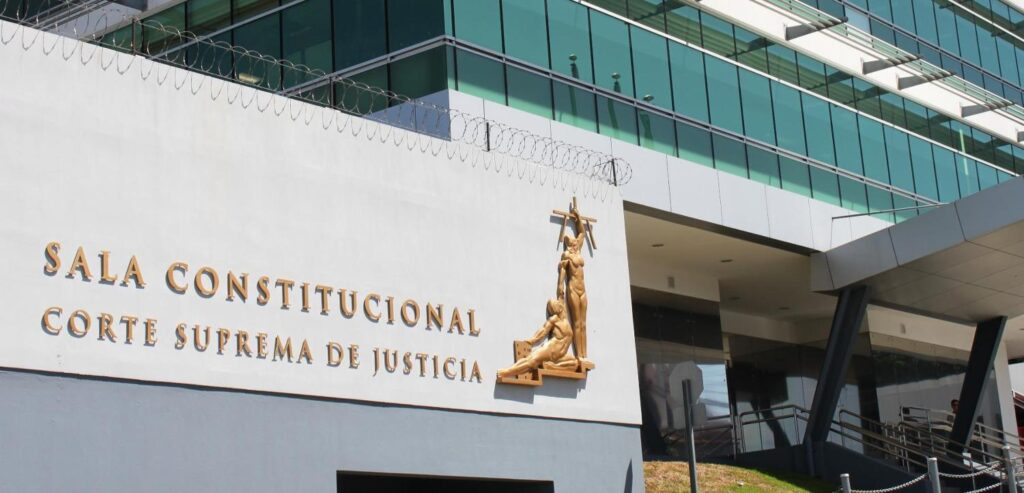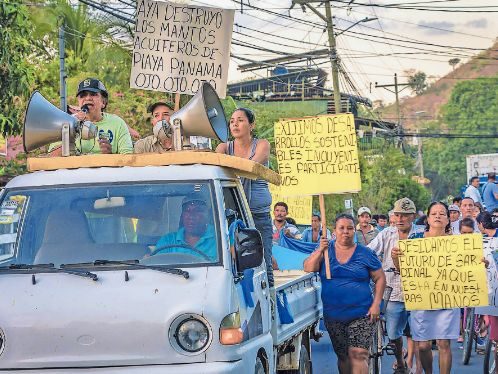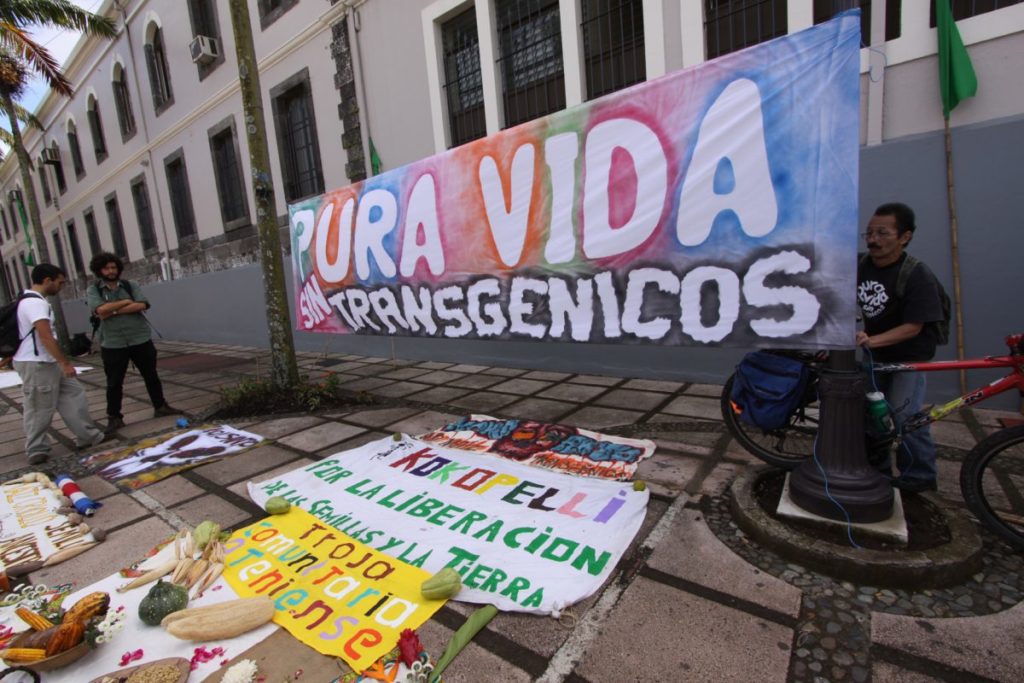Citizen participation in environmental matters: brief notes on a recent judgment

We share this text written by Nicolás Boeglin, professor of International Public Law at the University of Costa Rica on citizen participation in environmental matters.
In recent days, the 11236-2023 vote of May 12, 2023 of the Constitutional Chamber of Costa Rica, regarding an environmental feasibility granted by the National Environmental Technical Secretariat (SETENA) for a sanitary landfill in Miramar de Montes de Oro, was released.
As has become customary when it comes to a project that is being questioned, SETENA chose to grant this feasibility on December 14, 2022, reminding us of several other controversies in Costa Rica in which the second half of December is chosen. Such is the case, among many others,
- of environmental feasibility 3638-2005-SETENA of December 12, 2005 granted in the case of the Crucitas mining project;
- of resolution 2731-2007 of December 17, 2007 granting viability in Matapalo beach (Guanacaste) to a 700-room hotel megaproject;
- of resolution 2523-2014 of December 17, 2014 authorizing APM Terminals’ Moin container terminal project;
- of resolution 2331-2016 of December 15, 2016, authorizing the planting of 600 hectares of pineapple in the area adjacent to the Térraba Sierpe Wetland;
- or resolution 2146-2020 of December 16, 2020 regarding a waste gasification plant in Belén de Carrillo (see full text posted by the digital media LaVozdeGuanacaste).
Regarding citizen participation in environmental matters, in the specific case of the sanitary landfill in Miramar de Montes de Oro, SETENA considered that this requirement had been complied with by being satisfied with the results of the study of a sociologist hired by the company (called “Quantitative study of local perception“), without the need to proceed to hold a public hearing with the community of Miramar de Montes de Oro, held more than 10 years ago.
In its vote, the Chamber considers that SETENA’s failure to hold a new prior public hearing “violates the right recognized in Article 50 of the Constitution” and, consequently, annuls the environmental viability granted on the eve of the end of the year 2022 holidays.
A great effort by four members of the Constitutional Chamber for one word

Although this decision of the Chamber is to be welcomed, but above all, the persistence, courage and tenacity of the appellant who managed to convince the members of the Constitutional Chamber, the reading of this vote also denotes an internal division in the Chamber: in particular, a sustained semantic effort by the majority of the Chamber to refer to citizen participation in environmental matters as a “principle” and not a “right” is very evident. Even among the first references to its jurisprudence, the Chamber refers to vote 1163-2017, regarding the controversial Coco Ocotal aqueduct project in Sardinal, in which the Chamber, setting aside more than 20 years of jurisprudence, chose to no longer recognize citizen participation in environmental matters as a right. How so? As it reads.
Regarding such disconcerting – and unseemly – conclusion of the Costa Rican constitutional judge that can be read in paragraph V of judgment 1163-2017 (see full text), it is appropriate to recall that it was the subject of only two dissenting votes (subscribed by justices Fernando Cruz and Paul Rueda, whose reading is recommended). The five remaining justices at that time (2017) considered that going against the jurisprudence of the same Constitutional Chamber and the Inter-American Court of Human Rights, and all the evolution observed internationally since 1992 (Rio Declaration) to consolidate citizen participation in environmental matters as a true right, did not merit any particular reflection.
This jurisprudential “involution” to which the Costa Rican constitutional judge proceeded to date has not resulted in any rectification, despite numerous missed opportunities since 2017.
Citizen participation in environmental matters put in context
So as not to cause greater embarrassment than that caused by this decision of the Costa Rican constitutional judge of February 2017, we would like to refer our esteemed readers to paragraph 231 of the Advisory Opinion of the Inter-American Court of Human Rights released in the course of 2018 (see full text) which states, and this in a very clear manner, that:
231. Therefore, this Court considers that, from the right of participation in public affairs, derives the obligation of the States to guarantee the participation of the persons under their jurisdiction in the making of decisions and policies that may affect the environment, without discrimination, in an equitable, meaningful and transparent manner, for which they must have previously guaranteed access to relevant information.
In paragraph 242 of the same advisory opinion of the Inter-American judge, it reads that:

g. States have the obligation to guarantee the right to public participation of persons under their jurisdiction, enshrined in Article 23(1)(a) of the American Convention, in the making of decisions and policies that may affect the environment, in accordance with paragraphs 226 to 232 of this Opinion.
Fully in line with the ruling of the Inter-American Court of Human Rights, in the Escazú Agreement adopted in March 2018, Article 7 refers to public participation as a “right”, reading that:
Article 7. 1: Each Party shall ensure the right of public participation and, to this end, undertakes to implement open and inclusive participation in environmental decision-making processes, based on domestic and international regulatory frameworks.
It is also indicated in another section that:
Artículo 7.4. Each Party shall take measures to ensure that public participation is possible from the early stages of the decision-making process, so that public comments are duly considered and contribute to such processes. To this end, each Party shall provide the public, in a clear, timely and understandable manner, with the information necessary to give effect to their right to participate in the decision-making process”.
(emphasis added)
Predictably, neither the Escazú Agreement, nor the use of the term “right” to refer to citizen participation appear under the pen of the examining magistrate in paragraph IV of the judgment in which he bases his reasoning.
Qualifications used against the appellant and Inter-American jurisprudence on the State’s obligation
As a point of detail, we find in the vote 11236-2023 the following statement by the Secretary General of SETENA when reading that (Result, point 3):
What the appellant mentions is a reckless expression that casts doubt on the work of the Environmental Evaluation Department and SETENA itself. The appellant is unaware of all the internal changes in the work methodology that have been made within SETENA, […].
It should be easy to understand that, for any resident of Miramar de Montes de Oro or observer, an environmental feasibility approved by SETENA in the second half of December usually raises reasonable doubts and suspicions; and that, contrary to what has been indicated, the decision of the Constitutional Chamber in this precise case confirms that the appellant is perfectly aware of SETENA’s methods.
Similarly, the general attorney of the company in charge of the sanitary landfill project considered it useful and appropriate to express herself against the appellant, when reading a few pages later (Resulting, point 5) that:
The statements made by the appellant cannot be qualified in any other way than reckless, disrespectful and biased, not only for SETENA but also for my client, who has always been characterized by transparency and strict adherence to the prevailing legislation in every project he undertakes.
Beyond the effect that an attempt to disqualify an appellant concerned about the negative effects of a certain project and who distrusts its authorities may have in a discussion of legal arguments before seven magistrates, the truth is that neither SETENA’s nor the company’s arguments found any echo in any of the members of the Constitutional Chamber.
Precisely, regarding the concerns that a project may generate and the transparency that every person can demand from their national authorities, it is worth mentioning that in a 2022 judgment of the Inter-American Court of Human Rights (Baraona Bray v. Chile case of 11/24/2022) on the criminal actions suffered by a renowned Chilean environmentalist, the Inter-American judge ruled as follows:
96. In addition, the Court recalls that participation represents a mechanism for integrating citizen concerns and knowledge into public policy decisions affecting the environment and enhances the capacity of governments to respond to public concerns and demands in a timely manner, helps build consensus, and improves acceptance of and compliance with environmental decisions. In addition, public participation makes it easier for communities to hold public authorities accountable for decision-making and improves the evidence and credibility of government processes. This is because democratic control by society, through public opinion, fosters transparency in government activities and promotes accountability of public officials for their public management.
In paragraph 100 of this same sentence, the Inter-American judge also affirmed that the guarantee of freedom of expression extends to persons who defend the environment, stating that:
the Court considers that the respect and guarantee of freedom of expression in environmental matters is an essential element to ensure the participation of citizens in the processes related to such matters and, with it, the strengthening of the democratic system through the validity of the principle of environmental democracy.
In paragraph 114, the Inter-American judge went even further, explaining the reasons why environmental issues should always be considered a matter of public interest, stating that:
In this regard, this Court considers that the opinions, manifestations, ideas and information related to the protection or management of the environment, as well as those on the environmental risks and impacts of activities or projects, should be considered matters of public interest with respect to the protection of freedom of expression because, as it has recognized in its jurisprudence, the respect and guarantee of human rights cannot be separated from the protection of the environment. It should also be noted that the Court has recognized the existence of an undeniable relationship between the protection of the environment and the realization of other human rights, inasmuch as environmental degradation and the adverse effects of climate change affect the effective enjoyment of human rights. Consequently, for this Court there is no doubt that environmental issues should be considered matters of public interest in a democratic society and that it is incumbent upon States to protect freedom of expression and encourage citizen participation in these matters.
It should be noted that in this important judgment that condemned Chile in 2022, the Inter-American judge makes several references to the Escazú Agreement, fully integrating it into the Inter-American corpus juris. We already had the opportunity to indicate in this regard in an article published in April 2023 that:
[…] there is no doubt that since its adoption in 2018, the Escazú Agreement contributes, from now on, to substantially enrich the corpus juris of the inter-American judge, allowing him to specify and consolidate the scope of the obligations of the States in this matter. This judgment should already be of interest to all States of the American hemisphere that are members of the inter-American human rights system.
Note 1
Persistent fear of citizen participation in environmental issues
In a 2014 study by jurist Álvaro Sagot Rodríguez on the repeated environmental regressions of the Costa Rican constitutional judge, the author cites a 2012 decision of the Constitutional Chamber in which it reads verbatim that:
In this sense, environmental law could not lead to a tyranny of citizen participation (sic).
Note 2
There is no doubt that citizen participation in environmental matters is a singularly irritating issue for some sectors and jurists in Costa Rica, to the point of leading the latter to express themselves in such a peculiar way as constitutional magistrates.

In this sense, it is not superfluous to recall another rather unusual fact that highlights the deep fear that citizen participation provokes in some sectors: in 2008, the only law approved by the Legislative Assembly that was vetoed by the Costa Rican Executive Power during the entire period 2006-2010, was the “Law to Strengthen the Mechanisms for Citizen Participation in Environmental Matters” (see full text accompanied by the text of the presidential veto of November 24, 2008). In the work report for the 2008 period of an influential business chamber, we read that:
Likewise, by the end of the year, UCCAEP exerted the necessary pressure for the President of the Republic to veto the Environmental Law. To this end, a series of opinion articles were published and several representatives were present in the media regarding the position of the business sector with respect to the law approved by the Legislative Assembly.
(véase texto del informe de la UCCAEP titulado “Informe de Labores, Marzo 2009”, p. 36)
We can also refer to the discussion provoked in Costa Rica regarding the Escazu Agreement in recent years, as a result of official communications from the same group and several others, as well as audios and writings circulated by some jurists, and a “note“, now famous, written by a magistrate of the Constitutional Chamber in March 2020 (see vote 06134- 2020 that contains it). It should be recalled that in the first debate, the Escazu Agreement was adopted by a vote of 44 votes in favor and none against in February 2020.
In conclusion
Beyond the great ease with which some in Costa Rica manage to stop initiatives voted by the Legislative Assembly, in their concurring vote to sentence 11236-2023 of May 12, 2023 (whose complete reading is recommended – paragraph VII – ) magistrates Hubert Fernández, José Rafael Garita and Paul Rueda considered it appropriate to specify (making reference to several international instruments of human rights and environmental law, among them the Escazú Agreement, as well as the aforementioned jurisprudence of the Inter-American judge) that citizen participation in environmental matters is a right that any Costa Rican citizen has (a right that any Costa Rican citizen has), among them the Escazú Agreement, as well as the aforementioned jurisprudence of the Inter-American judge) that citizen participation in environmental matters is a right that assists any Costa Rican citizen (a participation that, until 2017, was so qualified by the Constitutional Chamber in countless votes (Note 3).
The three above-mentioned magistrates further expressed that:
Participation is a fundamental right, since it is an expression of the democratic principle of the social rule of law that seeks to facilitate the participation of all in the decisions that affect them.
We also read from these three members of the Constitutional Chamber that:
… it is of constitutional relevance that the State guarantees the public hearing as a right, through the forms of direct participation of citizens in matters that may have an environmental impact.
It is to be hoped that, inspired by this valuable concurring vote, the Constitutional Chamber will soon succeed in rectifying the semantic drift to which it has proceeded since 2017, which clearly constitutes a true jurisprudential regression.
And with regard to the Escazú Agreement, and the fact that the majority of the Chamber persisted in not making any reference to this vanguard instrument in the grounds of this May 2023 judgment (despite being able to do so), recently, jurists Rafael González Ballar and Mario Peña Chacón indicated in an article entitled “The inter-Americanization of the Escazú Agreement and its implications for Costa Rica“, published in this same space of DerechoalDía (and whose complete reading we recommend), that:
… as of the Inter-American judgment Baraona Bray vs Chile, the Escazú Agreement became part of the Costa Rican constitutional block as a source and international standard on human rights and the environment
Nicolás Boeglin, in collaboration with Sensorial Sunsets
Notes
Note 1: See BOEGLIN N., “Acuerdo de Escazú, viento en popa: Corte Interamericana de Derechos Humanos lo incorpora, mientras persiste insólita ausencia de Costa Rica“, Portal de la Universidad de Costa Rica (UCR), Voz Experta Section, edition of 10/04/2023. Text available here.
Note 2: See SAGOT RODRÍGUEZ A., “(In) justificaciones constitucionales que han permitido regresiones ambientales“, Revista Judicial, Number 114 (December 2014), pp. 61-93 available at this link (where the referred quote can be read on page 93), as well as at this other link, where the referred quote can be read on page 30.
Note 3: See for example vote 06922-2010 of April 2010 on the Crucitas mining project (paragraph XVII). Or vote 05593-2012 of May 2, 2012, which reads (paragraph V entitled On citizen participation in environmental matters) that: “In short, the right of participation in environmental matters is a fundamental right and a constitutionally protected principle, and as such, permeates the rest of the legal system, including all legislation, regulations and other environmental rules, even if it is not expressly established. This right translates into the obligation of the State to facilitate, guarantee, allow and provide access to the population in all instances, including administrative and judicial proceedings (in the terms of principle 10 of the Rio Convention), so that the members of the community can not only be eyewitnesses of a certain procedure but also be part of it and thus “react” to the violation of their right to the environment and thus seek the reparation of damages. This is because, according to the most recent concept of legitimization in environmental matters, the right to access, to intervene, to participate and to be a party, does not emanate from property titles, rights or concrete actions that could be exercised according to the rules of conventional law, but, being a diffuse interest, such right is diffused among all the members of a certain category of persons who are thus equally affected by the illegal acts that violate them“. It is also worth mentioning vote 06322-2003 of July 3, 2003, which states, in relation to the participation of the municipalities (Paragraph IX, clause 11) that: “It is clear that the participation of citizens and municipalities is of transcendental importance in order to promote awareness of environmental problems and to assist in the decision making of the institutions in charge of the preservation, surveillance and protection of the environment and natural resources. This principle had already been recognized in a dissenting vote of Magistrates Piza, Solano and Arguedas in sentence number 4423-93, supra cited, not only as a right of participation, but also as a duty of the community and municipality in the decision making and discussions on the location of a sanitary landfill in Esparza”.
Previous article A Memorable Journey to the Music of the 80's in Costa Rica: Tribute Concert to "Kuarta".
Navigate articles



